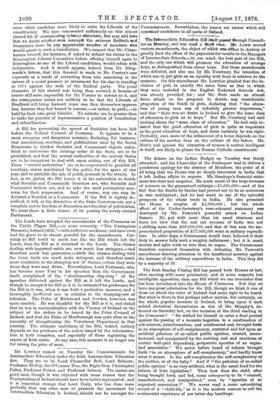The debate on the Indian Budget on Tuesday was thinly
attended ; and the Chancellor of the Exchequer bad to deliver a ponderous apology for the absence of Members, the point of it all being that the House was so deeply interested in India that it left Indian affairs to experts. Mr. Stanhope's financial state- ment was clear and sanguine. He made much of the large increase of revenue on the guaranteed railways-11,693,000—and of the fact that the deaths by famine had proved not to be so numerous as was anticipated ; and he had much to say of the splendid prospects of the wheat trade in India. He also promised the House a surplus of £2,000,000; but the whole effect of the Under-Secretary's rose-coloured statement was destroyed by Mr. Fawcett's powerful attack on Indian finance. He put with more than his usual clearness and force his view that the real net revenue of India was not a shilling more than £39,000,000, and that of this sum the un- precedented proportion of £17,000,000 went in military expendi- ture. In other days, a Government would have believed it their duty to answer fully such a weighty indictment ; but it is much shorter and safer work to vote than to argue. The Government therefore contented themselves with defeating Mr. Fawcett's amendment drawing attention to the insufficient security against the increase of the military expenditure in India. This they did by a majority of 39.






























 Previous page
Previous page